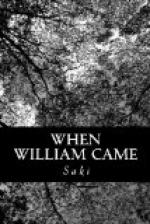“There are many in the land, or at least in London,” said Yeovil.
“There are even more of them now than there used to be,” said Holham. “I am to a great extent a disliker of Jews myself, but I will be fair to them, and admit that those of them who were in any genuine sense British have remained British and have stuck by us loyally in our misfortune; all honour to them. But of the others, the men who by temperament and everything else were far more Teuton or Polish or Latin than they were British, it was not to be expected that they would be heartbroken because London had suddenly lost its place among the political capitals of the world, and became a cosmopolitan city. They had appreciated the free and easy liberty of the old days, under British rule, but there was a stiff insularity in the ruling race that they chafed against. Now, putting aside some petty Government restrictions that Teutonic bureaucracy has brought in, there is really, in their eyes, more licence and social adaptability in London than before. It has taken on some of the aspects of a No-Man’s-Land, and the Jew, if he likes, may almost consider himself as of the dominant race; at any rate he is ubiquitous. Pleasure, of the cafe and cabaret and boulevard kind, the sort of thing that gave Berlin the aspect of the gayest capital in Europe within the last decade, that is the insidious leaven that will help to denationalise London. Berlin will probably climb back to some of its old austerity and simplicity, a world-ruling city with a great sense of its position and its responsibilities, while London will become more and more the centre of what these people understand by life.”
Yeovil made a movement of impatience and disgust.
“I know, I know,” said the doctor, sympathetically; “life and enjoyment mean to you the howl of a wolf in a forest, the call of a wild swan on the frozen tundras, the smell of a wood fire in some little inn among the mountains. There is more music to you in the quick thud, thud of hoofs on desert mud as a free-stepping horse is led up to your tent door than in all the dronings and flourishes that a highly-paid orchestra can reel out to an expensively fed audience. But the tastes of modern London, as we see them crystallised around us, lie in a very different direction. People of the world that I am speaking of, our dominant world at the present moment, herd together as closely packed to the square yard as possible, doing nothing worth doing, and saying nothing worth saying, but doing it and saying it over and over again, listening to the same melodies, watching the same artistes, echoing the same catchwords, ordering the same dishes in the same restaurants, suffering each other’s cigarette smoke and perfumes and conversation, feverishly, anxiously making arrangements to meet each other again to-morrow, next week, and the week after next, and repeat the same gregarious experience. If they were not herded together in a corner of western London, watching each other with restless intelligent eyes, they would be herded together at Brighton or Dieppe, doing the same thing. Well, you will find that life of that sort goes forward just as usual, only it is even more prominent and noticeable now because there is less public life of other kinds.”




